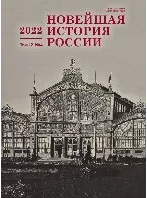Коллективный портрет делегатов съездов Советов в 1917–1936 гг.
‘Collective Portrait of Delegates to the Congress of Soviets in 1917–1936
Author(s): Boris N. MironovSubject(s): Governance, Diplomatic history, Social history, Government/Political systems, Political behavior, Politics and society, Evaluation research, Pre-WW I & WW I (1900 -1919), Interwar Period (1920 - 1939), Geopolitics
Published by: Издательство Исторического факультета СПбГУ
Keywords: Congress of Soviets; delegates; electoral laws; qualifications; lishenets; electoral technologies; electoral behavior;
Summary/Abstract: Analysis of the party, socio-professional, ethnic, educational, gender and age composition of the delegates to the All-Russian and All-Union Congresses of Soviets in 1917–1936 discovered that the revolution brought to power new people. If the majority of the members of the State Duma and the Constituent Assembly belonged to the political cream of the elite and counter-elite, then the majority of the delegates to the Soviets were bone from the bone of the lower orders and reflected the cultural level of the majority of voters and shared socialist ideas and were zealous conductors of them in life. Overrepresented in the Soviets were members and candidates of the CPSU, men, youth and persons of early adulthood, employees, military personnel and intellectuals, Russians, educated; and underrepresented are members of other parties and non-party people, peasants, pro-bourgeois elements and persons from the former privileged strata, women, non-Russians, persons of mature and old age, illiterate. By age and education, delegates were not suitable for serious parliamentary activity, since they lacked education, worldly wisdom and political maturity. The new electoral law of 1918 was of fundamental importance for the creation of a loyal pro-Bolshevik deputy corps. The law established a system of indirect, multistage, class, qualification elections, very similar to the pre-revolutionary electoral law of 1907. Qualifications were introduced that increased the number of pro-Bolshevik voters; the election procedure was changed, allowing the authorities to take control of the nomination of candidates and the voting process. The policy of restriction found a response and approval among the broad masses, gave them a feeling of deep satisfaction, since they began to feel themselves like privileged classes. Many, primarily millions of deputies of the Soviets of various levels, sincerely believed that they were taking part in governing the state.
Journal: Новейшая история России
- Issue Year: 12/2022
- Issue No: 41
- Page Range: 936-969
- Page Count: 34
- Language: Russian

